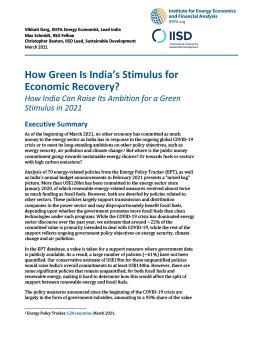
How Green Is India’s Stimulus for Economic Recovery?
How India Can Raise Its Ambition for a Green Stimulus in 2021
Is India's 'green recovery' green enough? IEEFA and IISD's new report shows the government’s stimulus is a ‘mixed bag’ for the country’s energy transition.
While India has committed more public money than any other economy to date – at least US$122 billion – to supporting the energy sector since the start of the COVID-19 crisis in early 2020, a new report shows the government’s stimulus is a ‘mixed bag’ for the country’s energy transition. The Government of India continues to promote a greener recovery by committing US$35 billion (28.5%) of the US$122 billion in energy-related funding to renewables, almost twice the US$18 billion (15%) flowing to fossil fuels.
Reposted with permission from IEEFA, originally published here.
You might also be interested in
COP27 diary (November 16): '$100 billion in climate finance more of gesture from rich countries'
The 27th Conference of Parties (COP27) to the United Nations Framework Convention on Climate Change in Sharm El-Sheikh, Egypt, began November 7, 2022. Here’s a look at what happened on day 10 of COP27 climate talks. The draft text for a cover decision is yet to be produced by the COP27 Presidency as of 7.30 am November 17, leading many to wonder how long discussions will continue to arrive at a consensus on the document once released. Just two days of the summit remain.
At long last, Canada restricts oil and gas subsidies (except for all the loopholes)
Environment and Climate Minister Steven Guilbeault has unveiled detailed plans to phase out "inefficient" oil and gas subsidies, based on guidelines released yesterday morning that take effect immediately and are meant to fulfill a 14-year-old pledge by G20 countries.
Heatwaves to hit China once every 5 years as global extreme weather events multiply, study finds
Record-breaking heatwaves that have scorched North America, Europe and China are set to worsen in future unless the world stops burning fossil fuels, according to a study by the World Weather Attribution (WWA) academic initiative.
Canada to Cut Oil & Gas Subsidies
The Canadian federal government has implemented a framework to revoke subsidies for fossil fuels that are deemed inefficient. However, the framework lacks details on the specific subsidies to be eliminated and does not provide a dollar amount for the cuts. Canada, as the fourth-largest oil producer in the world, is the first country to comply with a 2009 pledge made by the Group of Twenty (G20) nations. The government plans to exempt oil and gas projects that have plans to reduce emissions and utilize carbon capture and storage (CCS) technology. Federal Environment Minister Steven Guilbeault stated that the objective is for federal support to be directed only towards projects that decarbonize the sector and result in significant greenhouse gas emissions reductions.